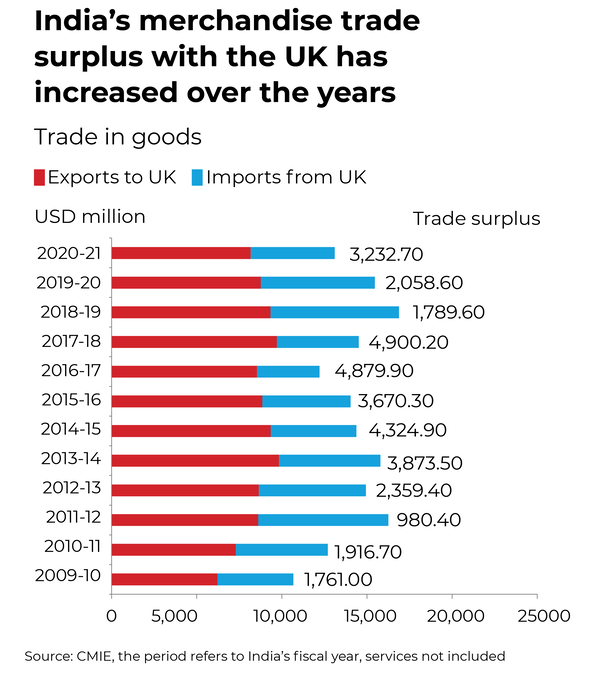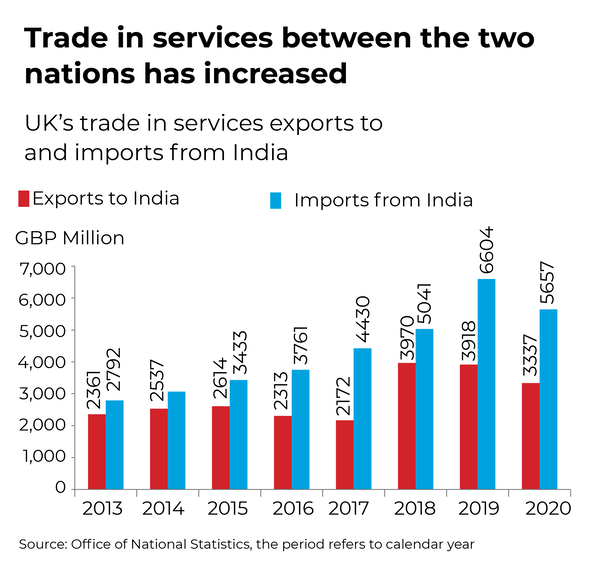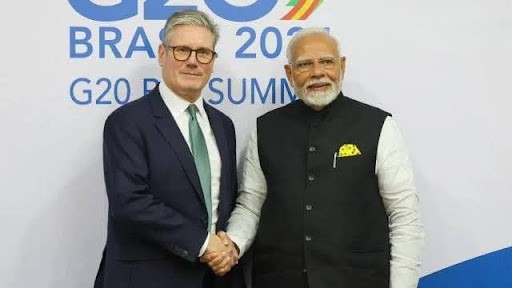Context:
India recently concluded a Free Trade Agreement (FTA) with the United Kingdom, known as the Comprehensive Economic and Trade Agreement (CETA). While it has been praised for its provisions in traditional sectors (agriculture, textiles), serious concerns have emerged regarding its digital trade chapter, particularly its impact on India’s digital sovereignty
Key Highlights of India UK Trade Pact:
India-UK Free Trade Agreement enhances economic ties by reducing tariffs, boosting trade in goods and services, and facilitating professional mobility. It benefits India’s services sector and MSMEs, while supporting UK exports and post-Brexit strategy. Strategically, it strengthens the bilateral partnership and positions both nations in a shifting global trade landscape.
Trade in Goods and Agriculture
- Duty-Free Access: Approximately 99% of Indian manufactured goods now enjoy tariff-free entry into the UK market.
- Gradual Tariff Reduction: Over a span of 10 years, India will lower import duties on UK-origin whisky to 40% and on automobiles to 10%.
- Seafood Exports: Tariffs have been lifted on 99.3% of Indian marine products, such as shrimp and tuna.
- Agricultural Products: 95% of agricultural and 99.7% of processed food items from India will enter the UK market without tariffs.
- Geographical Indications (GI): Indian products like feni, Nashik wine, and Kerala toddy have secured GI recognition in the UK.
Services and Movement of People
- Professional Entry: Indian professionals in IT, law, finance, and architecture benefit from eased access to the UK market.
- Visa Opportunities: An annual quota of 1,800 visas is designated for Indian nationals including chefs, yoga trainers, and artists.
- Business Travel: The FTA facilitates smoother short-term movement for service providers and corporate transferees.
- Social Security Agreement: A mutual arrangement prevents dual social security payments and supports pension portability for workers.
Investment and Government Procurement
- Access to Public Contracts: UK businesses can participate in Indian government procurement tenders above ₹200 crore as Class II suppliers.
- Domestic Input Requirement: To qualify, at least 20% of the contract value must be sourced from within the UK.
- Investor Dispute Mechanism: Arbitration can be initiated only if consultations between the investor and the state fail to resolve issues within one year.
Digital Trade and Technology Collaboration
- Electronic Trade Facilitation: Customs and trade documentation will be handled digitally, using e-documents and secure authentication.
- Cross-Border Data Flow: The agreement permits cross-border data transfers with appropriate safeguards and no mandatory data localisation.
- Protection of Proprietary Software: Companies are not required to disclose source code or proprietary algorithms.
- Minerals and Supply Chain Research: The UK will invest £1.8 million in an IIT Dhanbad-led initiative for global digital supply chain mapping of critical minerals.
Possible Gains for India from the FTA
- Enhanced Export Profile: Easier access to the UK market enables India to move up the value chain in its export portfolio.
- Support for Agriculture: Increased agricultural exports are expected to raise farmers' earnings and promote rural economic development.
- Edge in Textiles: Preferential market entry strengthens India’s competitiveness in textiles against other Asian producers.
- Digital Sector Expansion: The rise of Global Capability Centres (GCCs) is likely to fuel growth in service exports and generate high-skill employment.
- Strategic Mineral Access: Integration with UK mineral supply chains aids India’s clean energy goals and domestic battery manufacturing.
- Increased Investment: Clear regulations and protection measures are likely to attract more UK investments into key Indian industries.
- Technology Collaboration: Joint research and development efforts are set to enhance high-tech manufacturing and foster innovation-driven alliances.
Note: Global Capability Centres (GCCs) serve as offshore service units for global companies, offering IT, financial, and data analytics services, helping them optimize costs and operations.


Key Challenges Facing India:
- Source Code Disclosure Prohibition: India agreed not to demand access to source code from U.K. companies as a precondition to market access. Denying regulators this access weakens their oversight ability. This reverses India’s earlier stand at the WTO where it advocated for the right to examine source code in sensitive digital services.
- Open Government Data Access: India agreed to provide equal and non discriminatory access to U.K. firms to India’s open government data. Government data fuels AI models, economic analytics, market predictions, etc. Sharing it with foreign firms undermines India’s competitive edge in the digital economy.
- Security risks if sensitive national data is used irresponsibly.
- Free Flow of Data & Data Localisation Risks: India has consistently supported data localisation. This FTA Opposed the “free flow of data across borders” narrative pushed by Western countries.
- Wrong Precedent: This creates a precedent and limits India’s future negotiation flexibility
- Threat to Regulatory Autonomy: These concessions may limit India’s ability to make or enforce digital laws in future
- Digital Colonialism India risks becoming a “digital colony”, a consumer of foreign digital technologies and platforms, rather than a producer and exporter
- Deferred Benefits: The phased tariff reduction over a decade delays immediate export growth and competitiveness gains.
- Export Limits: Quotas on electric vehicles, food products, and premium alcoholic beverages restrict India's potential to scale up exports.
- Infrastructure Bottlenecks: Inefficient clearance systems and delays in verifying Geographical Indications (GI) affect timely shipments and regulatory compliance.
- Low-Value Export Mix: India's trade focus remains on low-value items, missing out on the more lucrative segments of the UK market.
- Regulatory Hurdles: Differences in safety and quality standards act as barriers for processed food, dairy, and pharmaceutical exports.
- Limited Mobility Access: The actual movement of professionals may fall short due to restrictive UK domestic immigration policies, despite FTA provisions.
- Geopolitical Tensions: Ongoing issues such as Khalistan-linked protests and unresolved extradition cases continue to affect diplomatic relations between the two countries.
Strategic Recommendations and Broader Significance
- Develop a Digital Sovereignty Policy: India needs a comprehensive digital industrial policy, focusing on:
- Data governance
- Indigenous tech development
- Digital trade strategy
- Strategic autonomy
- Expert-Driven Negotiation Teams: Trade negotiators must include technology and cybersecurity experts, not just economists or bureaucrats with access to the highest political decision-makers.
- Raise Public and Political Awareness: Digital issues are invisible and complex, but crucial. There’s a need to build public discourse, like on agriculture or defense.
- Phasing Out Quotas: India should seek the gradual removal of tariff-rate quotas that currently restrict its key export sectors.
- Aligning Regulations: Advocating for mutual recognition of standards in safety, food, and pharmaceuticals can ease non-tariff barriers.
- Carbon Collaboration: Proposing joint carbon offset mechanisms could help both nations pre-empt potential carbon border adjustment measures (CBAM).
- Expanding IT Hubs: Incentivizing the establishment of Global Capability Centres (GCCs) in non-metro areas will broaden India's digital services footprint.
- Technology Partnerships: Strengthening bilateral R&D to include sectors like semiconductors, defence technologies, and quantum computing will deepen innovation ties.
- FTA Implementation Framework: Establishing joint committees to oversee compliance, address grievances, and conduct periodic reviews will ensure smooth execution.
The United Kingdom stands as India’s fourth-largest export market and the eleventh-largest trading partner, with a diaspora of over 1.5 million people playing a pivotal role in strengthening bilateral engagement.
The India–UK Free Trade Agreement marks a strategic shift in India’s trade policy—rooted in mutual trust and aimed at delivering mutual benefits in a multipolar global order. Beyond traditional trade, the agreement positions India to assert its influence in the global digital landscape while boosting resilience, job creation, service exports, and digital sovereignty—solidifying the Comprehensive Strategic Partnership between both countries.
Understanding Free Trade Agreements (FTAs)
Free Trade Agreements are negotiated arrangements between two or more nations or trading blocs aimed at reducing or eliminating tariffs and non-tariff barriers on a significant portion of their mutual trade.
They typically encompass trade in both goods—such as agricultural and industrial products—and services like finance, construction, and commerce. FTAs may also include provisions related to areas like intellectual property rights.
An Early Harvest Scheme often serves as a preliminary step toward a full-fledged FTA or other comprehensive trade agreements.
FTAs operate as exceptions to the Most Favoured Nation (MFN) principle established under the World Trade Organization (WTO), allowing member countries to offer preferential treatment to one another.
Status: India has signed 13 FTAs in the last five years with its trading partners like Mauritius, UAE, Australia, etc (SBI Report).

For Prelims: FTAs,
For Mains: India UK Trade issue, Digital Sovereignty, Digital Data Protection Bill
SOURCE: The Hindu
Practice Question:
Q. Discuss how trade agreements can impact India’s ability to regulate its digital economy especially with respect to recently concluded India UK Trade Deal(250 Words) (15 Marks) |
Frequently Asked Questions (FAQs)
Ans. Digital sovereignty refers to a country’s ability to control its own digital infrastructure, data, digital economy, and policies without being dictated by foreign governments or corporations. In simpler terms: Just like political sovereignty ensures a country makes its own laws, digital sovereignty ensures that a country controls its own digital future — like how data is handled, who regulates software, and how technology is developed and used.
Ans. Source code is the core of any software. Access may be necessary to check for security risks, backdoors, or compliance with Indian laws.
Ans It is the idea that data of Indian citizens must be stored and processed in India.











